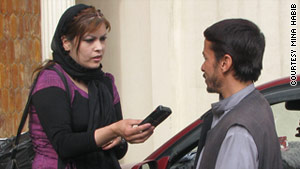
Mina Habib says it's important for Afghans to be journalists so they can tell the stories of their own people.
STORY HIGHLIGHTS
- Mina Habib is one of the few Afghan women journalists
- She says she has been threatened before but continues her work
- Her focus is children's issues; she says they're most important for the future of Afghanistan
(CNN) -- Mina Habib is doing what would have been unthinkable during the Taliban era. She is one of the few working female Afghan journalists.
For Habib, journalism is a passion, but it also helps support her family. Her father is unemployed, and her mother is partially paralyzed by a stroke.
From Kabul, Habib talked to CNN's Asieh Namdar about the challenges for women in Afghanistan and the inspiration, fears and risks associated with being a female journalist.
Q: Why did you want to be a journalist? Weren't you scared by the obvious risks?
A: I was aware of all the risks involved. Being a female journalist is not socially accepted. But I wanted to highlight the problems of women and children in Afghanistan. I felt I had a responsibility to tell their stories. I knew it would be a huge challenge and there would be many obstacles along the way, but I felt I had to do it, because my country needs Afghan journalists to tell the stories of their own people, to convey the problems that still exist.
Q: Were you inspired by anyone in particular? What are your favorite stories to cover?
A: It was my childhood dream to be a journalist, but no one [person] really inspired me. I like covering politics, exposing corruption and doing stories that involve children. My proudest story was exposing people who use sick children as beggars. A government commission banned the practice after my story.
 Her story: A day's work in Afghanistan
Her story: A day's work in Afghanistan Afghan women on the pitch and loving it
Afghan women on the pitch and loving it Female journalists under attack
Female journalists under attackQ: Were you ever threatened while covering these types of stories?
A: Yes. One of my reports had to do with child labor/child smuggling and children being used for suicide attacks. It was a story that had to be told. I came home that evening and found a letter on my door. I don't know who wrote it. It said my life would be in danger if continued my work as a journalist. I continued! I was also wounded last year while covering a suicide bombing in Kabul. My family blamed all this on my work. But I have no plans to stop.
Q: What's been the reaction, in your family and otherwise, to you wanting to be a journalist?
A: Like many Afghan families, they were totally against it. They wanted me to be a teacher or doctor. My family was worried about how I would be viewed and my safety. They thought it would be a tough job for a woman. They never supported me in this area.
Others are skeptical as well. They consider journalism "immoral work." I can hear them asking, "What is a girl doing outside the home, being a journalist?"
Q: How has life changed for you since the fall of the Taliban?
A: During the Taliban era, women could not work or get an education. They lived in fear. I'm working now, doing something I love. In Kabul, things are better, but in provinces, women are still afraid to work or study. Women can't appear in the media, work or study outside the home.
Q: How do you want to see yourself 10 years from now?
A: I want to be a successful and respected journalist -- to do my job, with freedom, without being threatened or harassed.
Q: What is your biggest fear today?
A: People standing in the way of me doing my work. Those who want to stop me from being a journalist. ... I blame cultural and social barriers that don't see women as equal to men. Even Islam says men and women are equal. But many still don't want to believe that. These are the same people who think it is inappropriate for women to even appear in public. I also blame government officials for not doing enough to ensure laws are balanced and fair for women.
Q: What do you do on your day off?
A: I live with my family, so I try to spend time with them. I help my mother and sisters. Sometimes, I bring my work home, writing my reports. My family gets upset. They want me to help with things around house more, instead of on my work.
Q: Do you think you yourself face greater dangers than international journalists who come to Afghanistan to report?
A: I think all journalists who are here to report the truth face danger.
Q: What do you want the world to know about you?
A: I want them to know that despite the obstacles before me, I will continue to work hard and be the best journalist I can be. I'm doing this for the children of Afghanistan because they are the future of this country.
Mina Habib writes for the daily Chiragh newspaper and the Institute for War & Peace Reporting. She received her journalism degree at Kabul University.







